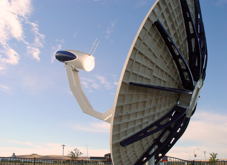 If you thought clean energy financings were hot last year, 2008 promises to be scorching. Case in point: Infinia today raised a $50 million series B, led by British hedge fund GLG partners. Existing investors Equus, Khosla Ventures, Bill Gross’ Idealab, and Paul Allen’s Vulcan Capital also participated in the round (after putting in $9.5 million just last June).
If you thought clean energy financings were hot last year, 2008 promises to be scorching. Case in point: Infinia today raised a $50 million series B, led by British hedge fund GLG partners. Existing investors Equus, Khosla Ventures, Bill Gross’ Idealab, and Paul Allen’s Vulcan Capital also participated in the round (after putting in $9.5 million just last June).
Infinia has developed utility-scale renewable energy technology that combines a Stirling engine with a large solar collector. The Stirling engine, a technology that’s been around since the 19th century, converts the heat into electricity. Infinia used to be called Stirling Cycles, and has been around for more than two decades. It has designed Stirling engines as power sources for NASA missions, implantable artificial hearts, and cooling devices that the army uses in Iraq. Now, it is focussed exclusively on using the technology to create 14-foot diameter solar collectors that can generate 3.5 kilowatts of energy apiece. Gang together 50 or 100 (at about $20,000 a pop) and you have the energy producing capacity of a small power plant.
Infinia’s Stirling engine is powered by a free-moving piston that requires no lubricants, and thus no maintenance. “What makes this unique is the no-maintenance profile,” says chief financial officer, Gregg Clevenger, “the ability to deploy a Stirling engine out in the desert and it is engineered to run for 20 years without you having to do anything.” It is also designed to be assembled with common mass-produced parts that an auto-parts supplier could manufacture. Getting the cost down is the key to creating a technology that is competitive with other forms of energy.
Using its Stirling engine technology, Inifnia thinks it can eventually produce electricity 20 to 30 percent cheaper than today’s existing solar panels. And in times of peak energy demand—on a hot summer day, for instance—it could even be competitive with electricity from gas-powered or coal-fired plants. Renewable energy isn’t going to replace fossil-fuel technologies off the bat, but if they make economic sense for utilities to deploy in a hybrid grid, they will become more cost-competitive over time. With this round, there is $50 million on the table that says Infinia will be one of the companies that makes renewable energy more affordable.